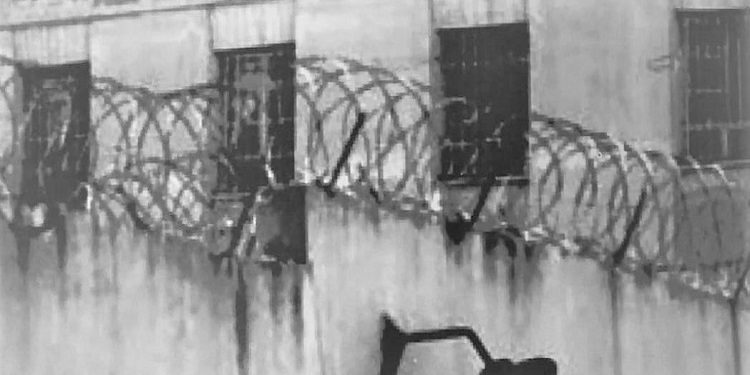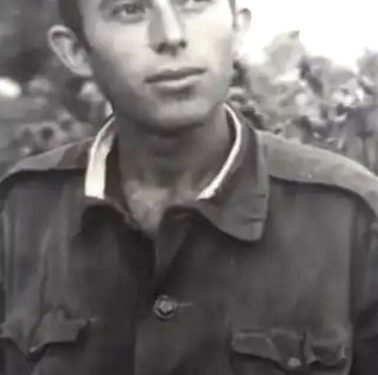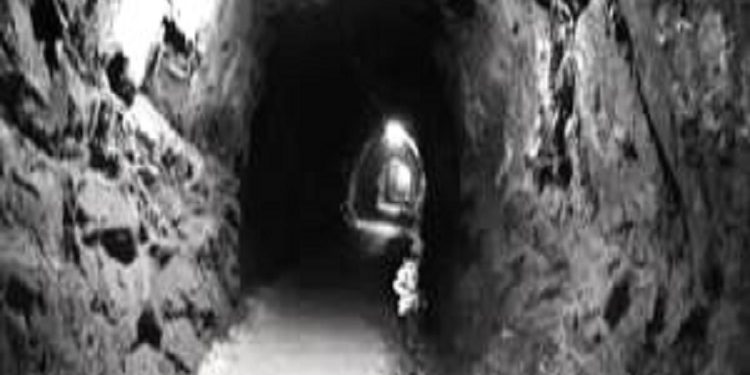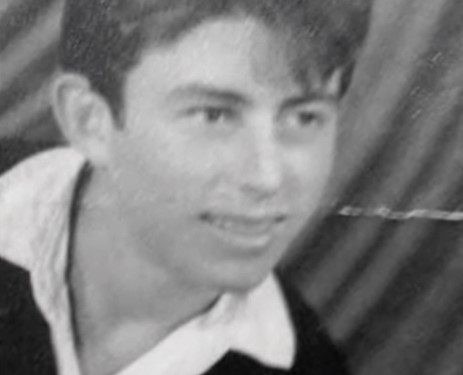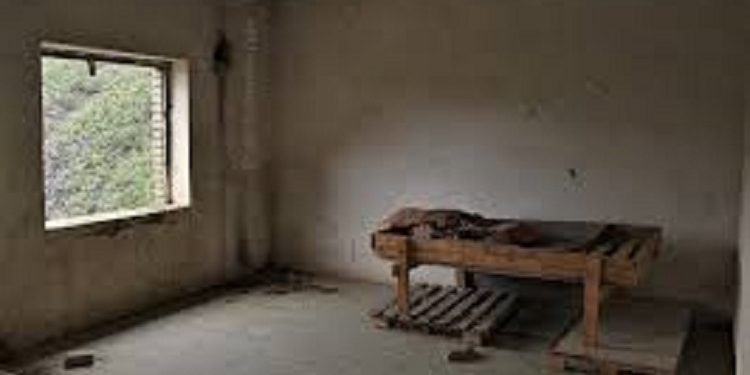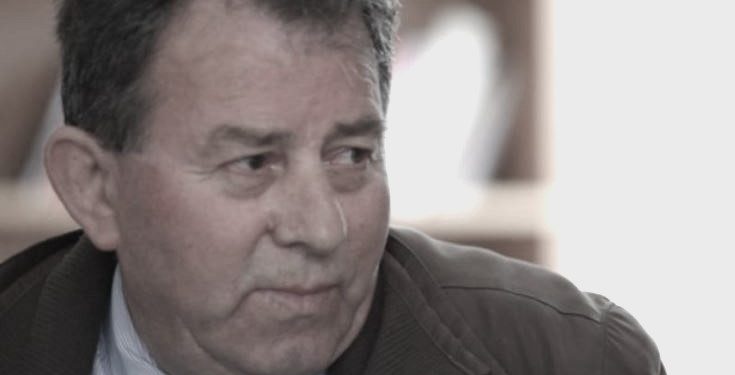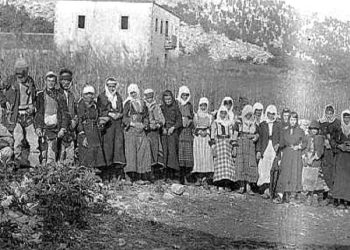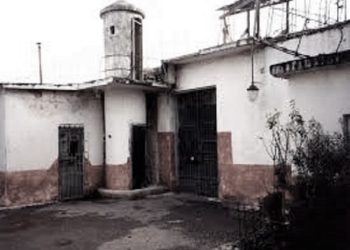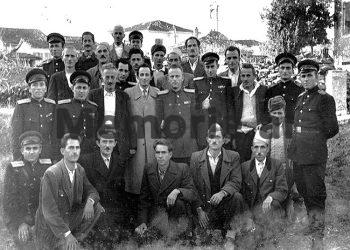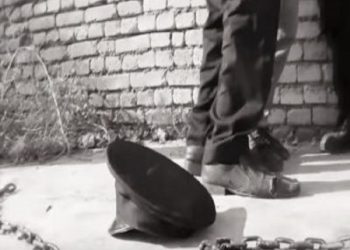By Shkëlqim Abazi
Part Fifty-Seven
Memorie.al / I were born on 12. 23. 1951, in the black month, of the time of mourning, under the blackest communist regime. On September 23, 1968, the sadistic chief investigator, Llambi Gegeni, the ignorant investigator, Shyqyri Çoku, and the cruel prosecutor, Thoma Tutulani, mutilated me at the Branch of Internal Affairs in Shkodër, split my head open, blinded one of my eyes, deafened one of my ears, after they had broken several ribs, half of my molars, and the thumb of my left hand. On October 23, 1968, they brought me to court, where the wretch Faik Minarolli gave me a ten-year sentence for political imprisonment. After half of my sentence was cut, because I was still a minor, sixteen years old, on November 23, 1968, they took me to the political camp of Reps and from there, on September 23, 1970, to the Spaç camp, where on May 23, 1973, during the revolt of political prisoners, four martyrs were sentenced to death and executed by firing squad: Pal Zefi, Skënder Daja, Hajri Pashaj, and Dervish Bejko.
On June 23, 2013, the Democratic Party lost the elections, a process more than normal in the democracy we aspire to. But on October 23, 2013, the Director-General of the “Rilindas” (Rebirth) Government sent Order No. 2203, dated 10.23.2013, for: The dismissal of a police employee. Thus, Divine Providence intertwined with the Neo-communist “Rilindas” Providence, and precisely on the 23rd, I was replaced, no less and no more, by the former Operative of the Burrel Prison Sigurimi (Secret Police). Could there be anything more meaningful than that?! The former political prisoner is replaced by the former persecutor!
The Author
SHKËLQIM ABAZI
Continued from the previous issue
R E P S I
(The Forced Labor Camp)
Memoir
The First Meeting
(The boat drowned in the cistern)
I am not able to confirm or deny this fact, since I was never in a cell with him. But on one occasion when I casually mentioned the event, I noticed him flinching, goosebumps ran across his face, and he immediately retreated and was not seen for some time. I did not try to bring it up again, but the conviction that this person had committed a crime, and, like Macbeth, was suffering and would suffer for his whole life, never left me.
Even though I lack information about the further fate of this individual, I still hold the opinion that: he must have suffered the crime he committed to the extreme, and surely, his soul will never find peace! Later, I met Ali Maliqi’s son, Avniu. I opened up this topic, but he briefly told me: “This whole story, my friend, has only one name: ‘THE CRIMES OF THE SIGURIMI!'”
I will now mention two examples of extreme sentences. Even though the courts had not explicitly issued capital sentences – execution by firing squad – these people nevertheless ended up dying, because the sentences exceeded the limits of physical age. Coincidentally, the two old men I knew had the same name, Karafil. One was from Dibër, the other from Devoll. Both had been sentenced beyond the limits of physical age, for two identical criminal offenses, and both met the same end, death. One in Burrel prison and the other in Ballsh camp.
Uncle Karafil from Dibër was an old man with a trimmed mustache, a bit gloomy, thin, tall, and slightly hunched over from age. Dressed in homespun trousers (tirq) and a white felt cap (qeleshe), which he never took off his head even when sleeping, but only shifted over his eyes to avoid the light, he had not yet broken away from the old fashion. His thoughts were just as archaic. His notions of honor and solemn pledge (besa) remained more or less the perceptions of an Albanian from the 1800s. When he spoke, he seemed a little naive, but when I got to know him closely, I realized I was wrong; he was intelligent, witty, with a rich regional vocabulary, and a rare singer. When he picked up the çifteli and sang with his drawn-out voice, thousands of verses poured out of his mouth that, as soon as he put the musical instrument aside, he could no longer repeat. I often asked myself: “Is this old man a bit of a poet?” Yes, he was a rhapsode!
Until the moment he was sentenced to prison, as the eldest, he led the family and the tribe. He managed with the sweat of his brow and honesty to feed his large family, although he was not counted among the wealthiest, but among the most hardworking. He had never been involved in political matters; he considered this: “A luxury for the rich! A pauper needs to secure bread for his kin and honor for his friends!” This had been his motto in life.
But it was not meant for him to spend his old age next to his wife! In 1967, the directive for the collective farming of agriculture without exception, throughout the country, was issued. It was mainly about the mountain areas because the rest had been completed in due time. Despite the propaganda for voluntary collectivization, in fact, the methods used were not as willing as was claimed. Where persuasion failed, violence began; one person was labeled a kulak, even if he might only have five dynym of land, two oxen, and ten goats; another was declared an “enemy of the regime” and thrown in prison for ten years for agitation and propaganda, to set an example for others, and in the end, willingly or unwillingly, you would become a member of the cooperative.
However, in the cooperatives, they did not only pool land and labor but also livestock, such as small ruminants, cattle, or pack animals. The peasants were allowed to breed a limited number of small ruminants, such as ten sheep or goats, naturally only for a short period of time, as later they took them all. Such a small amount was considered sufficient for the weak peasant economy, which became even weaker.
Thus, after Uncle Karafil’s land, half of his sheep, and his yoke of oxen were taken, even though he was elderly, he was forced to work as a laborer in the cooperative because he did not receive any pension money, having never worked for the state. According to tradition, he had toiled his whole life in agriculture and animal husbandry.
Since he was elderly, the foreman assigned him light duties. But his hands itched and he could not rest; he had grown up with work. As soon as he finished in the brigade, he would start wandering the boundaries to collect grass for the oxen. In a way, he still considered them his property; at least that is how he comforted himself. Since he could not stand being without them, he took care of them and fed them, even though they would now be harnessed in the yoke in turns.
But the caretakers themselves had turned into hired hands; they only put the collar on them in the morning when it dawned and took it off in the evening when it darkened. What happened afterwards for their care, they did not care; they considered them everyone’s property, and consequently, no ones. And the oxen grew weak and emaciated, their hair fell out, and every day they looked more and more like some scabby dogs.
Uncle Karafil, when he saw them reduced to this condition, felt a pang in his heart, so he increased his efforts to feed those more. But Uncle Karafil’s care could not defeat the cruel treatment of the ignorant caretakers. This was the motive for the beginning. A mutual antipathy arose between him and those who worked with the oxen. On one hand, the old man accused them of excessive overwork, while on the other, the foremen insisted on achieving and exceeding the plans; a moment came when an insoluble commotion arose.
Ultimately, the old man found himself between two fires; with his misplaced remarks, he became a nuisance to the caretakers, and also unwanted by the leadership. Finally, they took advantage of his advanced age and ordered him not to show up for work anymore. In fact, they chased him away as a troublesome old man. They said it, they did it!
From the next day, Uncle Karafil was no longer accepted into the brigade. Now, he was left with the forest and the few sheep he owned. He rarely met the oxen, and only out of longing. But the tongue goes where the tooth hurts; the troubles of youth follow you, even in deep old age! His soul could not be separated from the oxen. He had raised and delighted in them with his own hands since they were calves, he had first harnessed them in the yoke, and when they became bulls, he had taught them through toil to open the furrow even without a caretaker behind.
One day in the pasture, when he saw his oxen among the cooperative’s herd, he could not resist approaching to share a moment with them. He called them by name, “Kazil” and “Verdhan,” as he had named them when they were little, and began to caress them. The oxen, with their large peaceful eyes, looked at him as if they wanted to express gratitude for the caresses. The old man looked at “Verdhan’s” glassy eyes; they were covered in eye discharge. Something was wrong. He took the towel from his neck and began to wipe it.
When his hand felt a large lump the size of a fist behind the nape, his fingers slipped over a viscous mass. He went to the other side, where he noticed a wound from which a thick, yellow liquid was draining. He squeezed the lump hard; large chunks of scabs and bloody pus flowed from the open hole in the ox’s skin. The old man’s eyes began to water. He burst into sobs. He cried and cleaned the wound, meanwhile whispering to it, as if caressing a child: “A kuku, poor ‘Verdhan’, my heart is weeping for you! / As your neck is a thorn-bush, so my heart is shedding bile! / Your wound without healing, has crushed my soul!”
He cleaned and bandaged it, then when the shepherd took them, he broke away with pain, as if parting from a dear relative whom he risked never seeing again. Someone behind the mound had heard this monologue and had denounced him to the Sigurimi. A few days later, “Verdhani” ended up in the slaughterhouse, while Uncle Karafil ended up in prison.
The “masters” had their moment. In this way, they would shut the mouth of the bothersome old man, and also strike fear into the village. In short, they twisted and spun the yarn until they plunged him inside, even though he was elderly. There, the ordeal of question-and-answer began:
“You cursed the Party!” – The investigators accused him. – “No, by Allah!” – The old man insisted. – “And what business do I have with the Party or the Party with me?!” – “You cursed Enver!” – The investigators continued their tune. – “Tobe estagfurullah! What business do I have with Enver, man? He is in Tirana, and in these parts, I neither know him nor does he know me, I neither killed him nor did he cut me!” “You deceived the cooperative!” – They said again. – “Gentlemen, I have no business with the cooperative! By Allah, they themselves threw me out of work, now I have my sheep, and with them, I spend the day in the forest!”
The investigation continued like this for many months. They searched the village to see if they could find any witness, but no one was willing to come forward; no one agreed to testify against him, not only out of respect for him but more out of fear of the vendetta. “Who knows, he is a big tribe, and come on, let’s cross him”? When they failed, the investigators changed tactics: based on the mentality of the highlanders of having a weapon at home, they drafted a plan. They hypothesized that the old man must have one too. But they could not figure out where in the attic of his house he was hiding it.
They tried all methods, from secret techniques with equipment and spies in the cell, up to physical torture. The old man did not give in, he did not open his mouth, and he resisted the brutal violence with self-denial and heroism.
However, like every living thing, he also had his weakness; he was a fanatical believer. He was known throughout the region as a devout man and an admirer of the holy book, the Quran. The investigators exploited this fatality. After much torture, they changed their method. They placed a thick book wrapped in green cloth on the table. – “Here, you have the Quran, put your hand on it and swear that you do not have a weapon! If you do, you will be free today,” they said. Uncle Karafil hesitated, but they forcefully placed his hand on the cloth.
The believing old man, in the eighty years of his life, had never felt weaker. He thought his hour of final confession had come; he remembered the sermons of the hoxha and the elders of the oda (guest room): “Before the Prophet, the truth and only the truth is spoken”! This education had accompanied him throughout his life, from childhood to deep old age; he could not lie before the image of God. The feeling that he was swearing with his hand on the holy book compelled him to tell the truth: – “By Allah, I have a ‘Martina’ hidden in the niche of the oda!” – He confessed.
The police rushed to the house, conducted a search, and, as triumphers, returned with the “Martina” in their arms. Immediately, with cynical sneers at the trick they had played on him, they unwrapped the cloth and waved a red-covered book in front of his eyes, with the figure of a bearded man stamped on it: – “See, this is the Quran, and this one here is our Prophet!” – They burst into laughter at his confusion.
Uncle Karafil realized the mistake he had made, but it was already too late; what was meant to happen had happened. So, with the last strength he had left, he spat at them with disgust: – “Ptuh… pig devils! You who mocked the Quran, not a stone upon a stone will remain of you! The curse of Allah will follow you for generations! Evil breed!”
The investigators, frightened that all their effort would be in vain and that the battered old man might die in their hands before being brought to trial, hurried up: they quickly put together the file, with the indictment for agitation and propaganda against the regime and illegal possession of a weapon. Within three days, they announced the date of the trial. The so-called trial!
They set up a sort of podium in the schoolyard of the village, under the shade of an apple tree, with some oak planks stretched over some stones and some wooden benches in the sun, supposedly for the spectators. They organized a public comedy with fellow villagers and communists brought from the surrounding villages. The lynching began.
The prosecutor sat in the most visible place; the portrait of the bearded, scowling Marxists-Leninists watched over him. Next to him, at a ninety-degree angle, the judging panel was lined up. Above them, like the sword of Damocles, the Commander-in-Chief smiled cynically. The trial was declared open by the chairman, a short, pale yellow man with thick, tortoise-shell glasses.
After finishing the formalities for the defendant’s genealogical data, he gave the floor to the prosecutor. The latter stood up, stern-faced and dignified, cast a comprehensive look at the crowd of peasants, as if to tell them: “I am the devil’s representative on earth,” then turned to the portrait of The One, saluted with a fist, and began to unleash a barrage of endless accusations against the old man.
Whoever heard this flood of accusations pinched themselves: “Is it me or not!” Everyone called on their memory, as if waking up, startled by a nightmarish rage: Could this be the real Uncle Karafil, the one we fellow villagers have known for decades, or do we have a deceptive doppelgänger before us!? Could his deeds have been so secret!? Oh, my, oh my-eee!”
“Oh, he must have been sold out to American imperialism and Soviet social-imperialism for a long time, huh!? And he’s been hiding saboteurs in his sheep pen! And he must have been an old spy for the U.D.B.?! Oh, my, oh my-eee! We, the simpletons, didn’t understand anything?! How could he, man, work with foreign agencies?! No way! He must have been that important, man! Oh God, what are our ears hearing! Say, he must have met the big shots of the world, man?! And we used to say he hadn’t even been to Peshkëpaj! Look, just look!?”
The wonder at what their ears were hearing exceeded the limits of the ignorant peasants’ imagination and turned into collective astonishment. But this belonged to the past; the astonishment would increase tenfold when the prosecutor would empty the bag with the final accusations. He focused on the moment when the cult objects, the mosques and churches, were destroyed. And the old man, “like those snakes in the sun, must have spewed his poisonous venom against the Party and Comrade Enver, but above all, he must have anathematized the youth and the masses. And worse, he could not bear it and must have exploded against the voluntary collectivization of the peasantry! He must not have left a stone unturned to put spokes in the wheels of the socialist locomotive!”
He must have called this method: “Voluntary collectivization, with a stick!” “What can you say to this, men that someone steals your property and livestock, which you worked your whole life to put together, and then you have to applaud the thief?” Then, he must have maliciously added: “Even Turkey, even Austria, even Italy, even Germany, even Serbia, even Greece; they killed us, man, but they didn’t steal our property! Now, some Toska thieves have emerged from somewhere, they want to take everything from us and leave us destitute! Men, this is a shame; it cannot be endured anymore!”
What the defendant had not said and done to hinder the revolutionary processes of the socialist youth and woman! And when no one listened to him, he must have even started a dialogue with the animals! His hostile activity extended everywhere, but it must have reached its peak when, with his deadly bile, he must have even infected ‘Verdhani’, his former ox, who after incitements in the ear from the defendant, ended up in the slaughterhouse!
And last, but not least, he maliciously armed himself with the wicked aim of organizing terrorist groups, to strike at the devoted people of the Party and the people’s power!” – While saying this, the prosecutor waved the rusty “Martina” from the time of Turkey over his head: – “Everything I mentioned above is documented, proven by eyewitnesses, who with their free will have confirmed it with their own mouths. I take this opportunity, in the name of Comrade Enver, the Party, and myself, to thank all collaborators who helped the people’s justice, for bringing this hardened criminal to justice…”!
The chain of accusations stretched so far that even: “If one-hundredth of them were true, the old man would deserve not the rope with pig fat, which for him would be a golden coin, but he would deserve to have his flesh cut with the shears of the vines!”
Then the question-and-answer duel began: “Oh, but you said this and that; no, but in such and such a year, you met so-and-so; no, but in X place, you welcomed and sent off Zenel Shehu, Hamit Matjani; no, but you were friends with Fiqiri Dine and Halil Ali, with the Kaloshs and the Agolls and countless others!”
At first, the old man was confused. He could not believe his ears when all those names of distinguished men were mentioned. But he collected himself, stood up without permission, and spoke: – “Gentlemen, I would be much honored to have all those renowned men as friends! But how could I have known them, how?! They are in Tirana and I am in the mountains, with the goats!”
When the prosecutor pompously pointed out the witnesses, he asked for them to be brought: let them tell him the truth face-to-face, man to man! But despite his insistence, no one testified. The prosecutor, red-faced down to the roots of his hair, claimed that they did not need witnesses, when the Party itself knew these issues, and he quoted the slogan: “What the Party says, the people do! What the people want, the Party does!” and others like these.
At the moment of the accusation of poisoning the ox, the trial turned into a comedy. Uncle Karafil claimed that: “It is not true that I said those words with which you accuse me: – Prove to me, honored sir, which I spoke to the ox!” – He addressed the prosecutor. – “How can a man talk to an animal, man?! Alright, I will take the blame that I told it exactly as your honor says, but who spied?! Either the ox spied on me, or I spied on myself, because there was no one else around!”
This joke turned the trial into an operetta sketch; the chorus of laughter echoed in the schoolyard. But at that moment, the chairman intervened, who closed the session. After an hour, he opened it again to give the verdict. Even though the prosecutor demanded a capital sentence in his plea, for a “sea of crimes,” the accusation was now reduced to agitation and propaganda and illegal possession of a weapon, a rusty “Martina.”
The chairman spoke in the name of the people: “Defendant, you are sentenced to seven years of deprivation of liberty, with five years of internment after the sentence is completed, as well as five years of loss of electoral rights. Your property, his share, is to be confiscated. The serving of the sentence begins from the day of arrest. Last word, defendant?”
-“I ask God to give me a long enough life to serve the sentence you gave me, so I can come out alive, just to spit in your face!”
With this, the judicial farce ended. The eighty-year-old would have to live another twelve years to at least complete the sentence given by the court, with imprisonment and internment.
However, the old man, who was considered so dangerous that they sent him to serve his sentence in Burrel prison, would die after six years. His soul would turn to the sky to rest near the Great God, while his mortal and skeletal remains would be buried with the many, in a pit next to “Qershiza,” as a curse that would follow the chairman who would die of consumption and the prosecutor who would die of a stroke! Memorie.al




